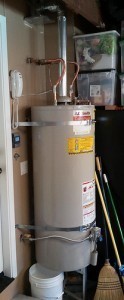 Corrosion is metal’s biggest enemy, and it’s fair to say that nobody wants any appliance they own to suffer from the weakening effects of corrosion. It’s one that especially applies to water heaters, which combine metal, water, and oxygen—the perfect mixture to start the chemical reaction that leads to corrosion.
Corrosion is metal’s biggest enemy, and it’s fair to say that nobody wants any appliance they own to suffer from the weakening effects of corrosion. It’s one that especially applies to water heaters, which combine metal, water, and oxygen—the perfect mixture to start the chemical reaction that leads to corrosion.
Fortunately for your water heater, it was designed with the dangers of rust and other forms of corrosion in mind. It has a number of safety designs to keep rust away: the inside of the tank is lined with glass; an overfill tank creates an air cushion for the water pressure without actually allowing oxygen into the tank; and a special device called an anode rod that runs from the top the bottom of the tank attracts corrosion to it so that it rather than the tank corrodes.
However, corrosion still can’t be prevented 100%. Your water heater may at some point start to show signs of corrosion. If this occurs, is it automatically time to replace the water heater?
Most of the Time, Yes
If there’s corrosion in or outside of the tank’s surface, it almost always means the water tank or the whole water heater must be retired and replaced. There’s no easy way to fix this corrosion, and it will spread, leading to leaking. If your water heater is more than 15 years old, corrosion is an indication that it has aged past its usefulness. You’ve already received a solid decade and half of service from it, so you’ve gotten a good return on your investment.
(To help ensure your younger water heater continues to run for this long, always arrange for regular service and occasional tank flushing form professionals.)
There Are Exceptions
If corrosion starts on the heat exchanger or some other smaller component of the water heater, it may be possible for a technician to replace only that part and spare the rest of the water heater. Ask you professional technician about the long-term outlook for the water so you’ll know if repairs are the best way to go; for an older system, replacement may still be more cost-effective than water heater repair.
Corrosion Can Occur with a Tankless Water Heater As Well
You may have read the above and thought, “Well, it sounds like this applies to storage tank system, but I have a tankless water heater.” Can a tankless system suffer from corrosion as well? Yes. However, it’s a less frequent occurrence since water comes into contact only briefly with a tankless water heater’s parts. But if leaks occur in a tankless system, water can get onto the gas burners and start corrosion. Flakes of rust will then start to block the burners and lower the efficiency and effectiveness of the system. Thankfully, the repairs for this are straightforward: technicians can detach the burners to remove the rust. Remember to keep up with regular maintenance and the system should be in minimal danger of corrosion.
Our plumbers are experts at handling services for water heaters in Orlando, FL. No matter if you suspect that corrosion means your water heater is done, or if you think it might be repairable, contact our team. We’ll put our 40 years of experience to work for your home.
Modern Plumbing Industries, Inc. has served Central Florida with superior plumbing since 1975.
